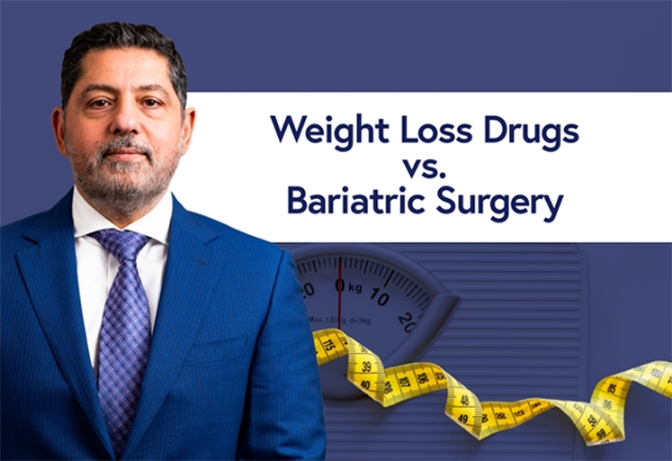Weight Loss Drugs vs. Bariatric Surgery – Which is Right For You?
If you’re trying to lose weight and finding it difficult, you may have considered taking medications or undergoing bariatric surgery. Both of these... read more
Call Us Today (732) 640-5316
E-Waiting RoomWhile stomach aches and pains may be common for you, they’re nothing to ignore. When the aches and pains in your stomach turn severe, get in touch with abdominal specialists. You may have an obstructed bowel. Talk to a doctor experienced in the nuances and potential dangers of bowel obstructions. Visit for an exam and consultation. If you need it, laparoscopic bowel obstruction surgery is minimally invasive, highly safe, and very effective. You’ll immediately feel better after the procedure. Advanced Surgical & Bariatrics of NJ, PA — serving northern New Jersey and eastern Pennsylvania — are ready to take your call.
Laparoscopic bowel obstruction surgery is a minimally invasive procedure that helps remove blockages in the small or large intestine. The blockage can be inside or outside of the intestine. It can cause either a partial or full obstruction. If left untreated, the condition can turn lethal — causing bleeding, tissue death, and infection of the abdominal cavities. When you suffer from bowel obstruction, the symptoms you may feel include:
Advanced Surgical & Bariatrics of NJ, PA, employs an expert team of doctors experienced in diagnosing and treating bowel obstructions. By feeling and listening to your abdomen — and using x-rays and CT scans — they can quickly diagnose and treat your bowel obstruction.
When your doctor diagnoses a bowel obstruction, it means that you have undigested food, fluid, and gas that can’t pass through your digestive tract normally. This condition can cause chronic abdominal pain, infection in your digestive tract, along with other digestion problems like chronic malnutrition. If left untreated it can be a life threatening emergency.
The most common cause of bowel obstruction is due to adhesions. These tough, fibrous bands of tissues sometimes develop after surgery. Other reasons for a bowel obstruction include:
After the initial diagnosis, your New Jersey doctor may request that you replenish your body with fluids and electrolytes like sodium, chloride, and potassium, especially if you’ve been vomiting. Your surgeon then decides which laparoscopic bowel obstruction surgery is necessary to treat your specific condition effectively. Depending on your condition, you may need:
Laparoscopic bowel obstruction surgery is also known as keyhole surgery because of the way the operation is performed. Common steps include:
Forever grateful of the staff and the doctors at this facility. Everyone is so pleasant,helpful and caring. Front desk staff and personnel was very helpful while I was in the process for my procedure, all questions, concerns were answered. Doctors were very detailed on the procedure and gave me the knowledge and confidence that this was the right choice. I have recommended this place to my friends and family and will continue to do so. Thank you staff and doctors for a great experience
Lileana C.Your specialist will advise you not to consume any foods or drinks for 6 to 12 hours before the procedure. Showering with antibacterial soap or body wash 2 days before the surgery and then the evening before your procedure is crucial to reduce the risk of infection. Usage of any blood-thinning medications must be stopped 2 days before laparoscopic bowel obstruction surgery to reduce the risk of serious bleeding. Your surgeon will advise you of any other specific requirements prior to surgery.
Your surgeon will provide you with final instructions on the day of your procedure. These will include:
Normally, the procedure only takes about 30 minutes, but it can take longer if your condition is particularly severe. Most people wake up immediately after the surgery and can leave shortly afterward. You won’t be able to eat anything until your doctor can confirm your bowels are working properly. One of the most common signs that you’re back to normal is being able to pass gas.
You have to stick to consuming only fluids in the beginning. You gradually move on to soft foods and then solid foods. Your recovery may take a few days, but this is a much shorter recovery than if you had an open bowel blockage surgery. Throughout the recovery period, you need to maintain check-ups with your doctor, especially if you had a serious condition like cancer.
If you’re having abdominal pain that lasts for more than a day or two, contact the doctors specializing in bowel obstruction treatment at Advanced Surgical & Bariatrics of NJ, PA. Don’t postpone the call — it may just save your life.

Dr. Ragui Sadek is a premier surgeon who established a state-of-the-art and one of the safest bariatric surgery programs in the state. Dr. Sadek has fellowship training in both laparoscopic/bariatric surgery and surgical trauma/critical care, allowing him to safely perform complex surgeries on patients who have been turned down by other practices. As a Clinical Assistant Professor of surgery at RWJ Medical School & the Director of bariatric surgery program at RWJ University Hospital, Dr. Sadek offers a cutting-edge range of laparoscopic, robotic, & bariatric surgical procedures with a complication rate substantially below the national average.
Dr. Sadek is a Clinical Assistant Professor of Surgery at Rutgers-Robert Wood Johnson Medical School and a Fellow of the American College of Surgeons. Having performed more than three thousand advanced surgical procedures, Dr. Sadek has established a strong patient satisfaction rate and a solid reputation among the surgical community and is renowned as a top physician in his field by International Association of Healthcare Professionals. As a board-certified surgeon, he holds affiliations with the American Society of Metabolic and Bariatric Surgery and the Society of American Gastro Endoscopic Surgeons. More about Dr. Sadek
Stay current with Advanced Surgical & Bariatrics of New Jersey

If you’re trying to lose weight and finding it difficult, you may have considered taking medications or undergoing bariatric surgery. Both of these... read more

Are you frustrated with your inability to lose weight? Tired of being trapped in an endless cycle of yo-yo dieting, over-exercising, cleanses, and... read more